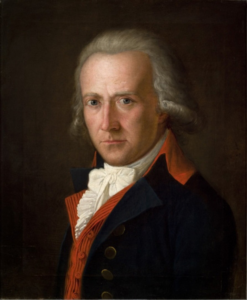The nearness of the spirits
(Poet's title: Geisternähe)
Set by Schubert:
D 100
[April 1814]
Der Dämmrung Schein
Durchblinkt den Hain;
Hier, beim Geräusch des Wasserfalles,
Denk ich nur dich, o du mein Alles!
Dein Zauberbild
Erscheint, so mild
Wie Hesperus im Abendgolde,
Dem fernen Freund, geliebte Holde!
Er sehnt wie hier
Sich stets nach dir;
Fest, wie den Stamm die Efeuranke
Umschlingt dich liebend sein Gedanke.
Durchbebt dich auch
Im Abendhauch
Des Brudergeistes leises Wehn
Mit Vorgefühl vom Wiedersehn?
Er ist’s, der lind
Dir, süßes Kind,
Des Schleiers Silbernebel kräuselt
Und in der Locken Fülle säuselt.
Oft hörst du ihn,
Wie Melodien
Der Wehmut aus gedämpften Saiten
In stiller Nacht vorübergleiten.
Auch fesselfrei
Wird er getreu,
Dir ganz und einzig hingegeben,
In allen Welten dich umschweben.
The light of dusk
Twinkles through the grove.
Here, next to the sound of the waterfall
I think only of you, my everything!
Your magical image
Appears, as gentle
As Hesperus in the evening gold,
To your distant friend, beloved beauty!
As here, he longs
For you always.
Firmly, like tendrils of ivy round a tree,
His thoughts embrace you lovingly.
Are you also aware, quivering through you
In the breath of evening,
Of the gentle motion of your brother spirit
With a presentiment of seeing you again?
It is he who is softly
(For you, sweet child)
Gathering together the silver cloud of your veil
And murmuring into the fullness of your hair.
You often hear him,
Like melodies
Of pain coming from muffled strings,
Floating past in the calm night.
Even unshackled
He will be true,
Devoted totally and uniquely to you
Hovering near you in all worlds.
All translations into English that appear on this website, unless otherwise stated, are by Malcolm Wren. You are free to use them on condition that you acknowledge Malcolm Wren as the translator and schubertsong.uk as the source. Unless otherwise stated, the comments and essays that appear after the texts and translations are by Malcolm Wren and are © Copyright.
☙
Themes and images in this text:
Arms and embracing Breath and breathing Brothers and sisters Chains and shackles Clouds Evening and the setting sun Gold Hair Hesperus, the evening star (Venus) Ivy Magic and enchantment Melody Mist and fog Night and the moon Rivers – waterfalls, rapids and whirlpools Silver Veils Wind Woods – groves and clumps of trees (Hain)
It is all pervasive. Like the evening light, the spirit of the distant friend breaks through the foliage (durchblinkt den Hain), sending out waves of longing towards her (nach Dir). It / He clings around her (umschlingt Dich) like ivy around a tree trunk, getting into her hair. He is perceived in passing (vorübergleiten) rather like the sobbing of muted strings. They are still chained together (in spirit if not with handcuffs). He is totally devoted to her and hovers around her (dich umschweben) in all possible worlds. He is all over the beloved and always will be (perhaps we could translate ‘in all worlds’ as ‘in all dimensions’). The addressee (O du mein Alles) is everything to the speaker, too.
This ubiquitous presence, the nearness of the spirits, appears to result from an experience of loss and distance (your magical image appears to the distant friend: Dein Zauberbild / Erscheint . . . / Dem fernem Freund). That is what loss is like. All we are aware of is the aching absence; it gets everywhere.
☙
Original Spelling and note on the text
Geisternähe
Der Dämmrung Schein
Durchblinkt den Hain;
Hier, beim Geräusch1 des Wasserfalles,
Denk' ich nur dich, o du mein Alles!
Dein Zauberbild
Erscheint, so mild
Wie Hesperus im Abendgolde,
Dem fernen Freund, geliebte Holde!
Er sehnt, wie hier
Sich stets nach dir;
Fest, wie den Stamm die Efeuranke
Umschlingt Dich liebend sein Gedanke.
Durchbebt dich auch
Im Abendhauch
Des Brudergeistes leises Weh´n
Mit Vorgefühl vom Wiederseh´n?
Er ist's, der lind
Dir, süßes Kind,
Des Schleiers Silbernebel kräuselt,
Und in der Locken Fülle säuselt.
Oft hörst du ihn,
Wie Melodien
Der Wehmuth aus gedämpften Saiten,
In stiller Nacht vorübergleiten.
Auch fesselfrei
Wird er getreu,
Dir ganz und einzig hingegeben,
In allen Welten dich umschweben.
1 The pirated edition of Matthisson's poetry that Schubert was using has the word 'Gesträuch' (bushes) here.
Confirmed by Peter Rastl with Schubert’s source, Gedichte von Matthisson. Neueste verbesserte Auflage. Wien und Prag bey Franz Haas 1810. pages 173-174; with Gedichte von Friedrich von Matthisson. Erster Theil. Tübingen, bei Cotta, 1811, pages 280-281, and with Gedichte von Friedrich von Matthisson, Fünfzehnte Auflage, Zürich: bei Orell, Füßli und Comp., 1851, pages 221-222.
To see an early edition of the text, go to page 173 [181 von 296] here: http://digital.onb.ac.at/OnbViewer/viewer.faces?doc=ABO_%2BZ169509602


